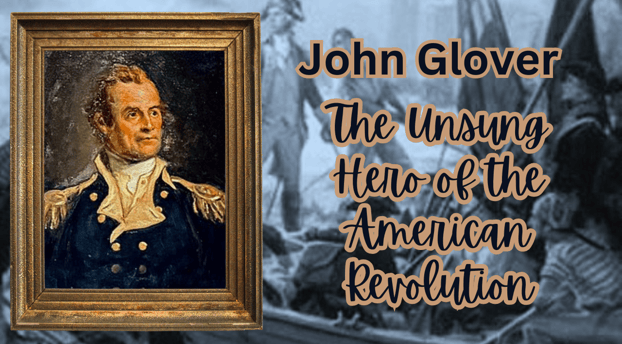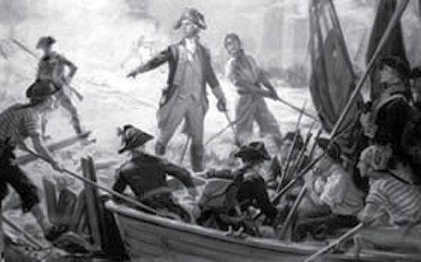John Glover: The Unsung Hero of the American Revolution
John Glover (November 5, 1732 – January 30, 1797) was a pivotal figure in the American Revolutionary War, remembered for his leadership, maritime expertise, and contributions to critical moments in the struggle for independence. A fisherman, merchant, and patriot from Marblehead, Massachusetts, Glover rose to the rank of brigadier general in the Continental Army. His innovative thinking marked his military career, his leadership of one of the first integrated regiments in the Continental Army, and his role in some of the most decisive moments of the war, including the formation of the United States Navy and George Washington’s iconic crossing of the Delaware River.
2/5/20254 min read


Early Life and Career
Born on November 5, 1732, in Marblehead, Massachusetts, Glover grew up in a bustling coastal town with a strong maritime culture.
The fishing and shipping industries shaped Glover's early years. These industries defined life in Marblehead.
Glover became a prosperous merchant and shipowner, managing a successful business before the outbreak of the American Revolution.
As tensions between the colonies and Great Britain escalated, Glover became an ardent supporter of the Patriot cause.
He actively participated in the local militia, which was common for many men in colonial New England.
By 1775, Glover had risen to the rank of colonel in the 14th Continental Regiment, later known as Glover’s Marblehead Regiment, which would earn a reputation as one of the most skilled and reliable units in the Continental Army.
Military Contributions
The Formation of the United States Navy
John Glover’s maritime background proved invaluable at the dawn of the American Revolution.
In the summer of 1775, Glover and his regiment played a crucial role in outfitting and manning the first American naval vessels authorized by General George Washington.
These ships, often referred to as "Washington's Fleet," were tasked with intercepting British supply ships.
Glover's expertise in navigation and shipbuilding helped lay the foundation for what would eventually become the United States Navy.
Glover’s efforts marked one of the earliest attempts by the Continental forces to challenge British naval supremacy, demonstrating the importance of maritime operations in the Revolutionary War.
The Battle of Long Island (1776)
One of Glover’s most significant contributions came during the Battle of Long Island, also known as the Battle of Brooklyn, in August 1776.
Following the British victory, the Continental Army was in a precarious position, surrounded by British forces and pinned against the East River.
Glover and his Marblehead regiment organized and executed a daring nighttime evacuation of Washington’s army across the river to Manhattan.
Using small boats manned by Marblehead sailors, Glover’s regiment ferried over 9,000 soldiers, along with horses, cannons, and supplies, under the cover of darkness and fog.
The operation was a stunning success, allowing the Continental Army to escape total annihilation and continue the fight for independence.
Washington Crosses the Delaware (1776)
Glover’s most famous moment in history came during Washington’s Crossing of the Delaware River on the night of December 25, 1776.
As Washington prepared a surprise attack on Hessian forces in Trenton, New Jersey, Glover’s regiment, with their maritime expertise, was called upon to transport the army across the icy Delaware River.
Despite treacherous weather conditions, Glover’s men successfully ferried 2,400 soldiers, artillery, and horses across the river, ensuring the success of the operation.
The subsequent Battle of Trenton marked a turning point in the war, boosting American morale and reinvigorating the Patriot cause.
Leading an Integrated Regiment
Glover’s Marblehead regiment was notable not only for its skill but also for its composition.
It was one of the first integrated military units in the Revolutionary War, including African Americans, Native Americans, and white soldiers.
This diversity reflected the inclusive ethos of Marblehead, a seafaring community where different racial and ethnic groups often worked together.
Glover’s leadership of this integrated regiment set an important precedent in American military history, showcasing the ability of diverse groups to work toward a common goal.
Later Service and Post-War Life
Glover continued to serve with distinction throughout the Revolutionary War.
He was promoted to brigadier general in 1777 and participated in key battles, including the Battle of Saratoga, where his leadership helped secure one of the most significant American victories of the war.
After resigning from active military service in 1779 due to health concerns, Glover returned to Marblehead, where he resumed his business and civic activities.
He remained a respected figure in the community, serving in local government and as a member of the Massachusetts legislature.
Legacy
John Glover’s contributions to the American Revolution cannot be overstated.
His leadership, maritime expertise, and ability to inspire his men were instrumental in some of the most critical moments of the war.
Marblehead Regiment: Glover’s regiment became a symbol of discipline, resilience, and innovation. Their actions during the Battle of Long Island and Washington’s Crossing of the Delaware were pivotal in ensuring the survival of the Continental Army.
Foundation of the Navy: Glover’s work in organizing Washington’s Fleet laid the groundwork for the development of the United States Navy, which would become a cornerstone of American defense.
Integration in the Military: By leading one of the first integrated regiments in American history, Glover demonstrated the value of diversity and inclusivity in the fight for independence.
Glover’s legacy is commemorated in various ways, including monuments and schools named in his honor.
His house in Marblehead, preserved as a historic site, reminds us of his contributions to the nation’s founding.
Conclusion
John Glover exemplified the ingenuity, courage, and determination that defined the American Revolution.
Glover's actions, from saving Washington’s army at Long Island to ensuring the success of the Delaware crossing, were critical in shaping the war's course.
Yet, his legacy goes beyond military achievements—his leadership of an integrated regiment and contributions to the fledgling U.S. Navy highlight his forward-thinking approach to unity and innovation.
As one of the unsung heroes of the Revolution, Glover’s story reminds us of the countless individuals whose efforts, often behind the scenes, were indispensable in securing American independence.
John Glover



